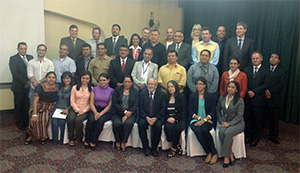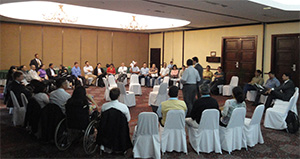Workshop “Environmental accounts and environmental tax reform”
The German Cooperation Agency GIZ, in collaboration with the Ministry of Finance and the Deputy Minister of Internal Administration and Systems Development of Guatemala, carried out on November 18 in Antigua, Guatemala, a workshop on Environmental Accounts and Environmental Tax Reform, based on the experience of Guatemala, which is one of the first countries in Latin America that has implemented them.
Officials of international organizations such as the World Bank and the Central American Institute for Fiscal Studies – ICEFI, participated in the workshop together with national institutions such as the Research and Social Studies Association – ASIES, the Planning and programming Secretariat of the Presidency – SEGEPLAN, the Ministry of Energy, Ministry of the environment, the Comptroller-General of Guatemala, and other national institutions of Guatemala.
Mr. Joerg Wisner, current Chief of the German mission at CIAT, and Ms. Zoraya Miranda, Technical Assistant of the Tax Studies and Research Directorate participated on behalf of the Inter-American Center of Tax Administrations – CIAT.
The first day of the workshop started with the introductory topic on Environmental Accounts by Mr. Dr. Martin Nowack, collaborator of the German GIZ , who explained about the GDP as an indicator for the growth of the national economy. He emphasized that no one talks about a green GDP that contributes to the well-being of societies that believe in the future of their children. If only the traditional GDP is taken into account, we may reach false conclusions not suitable for the environment. In addition, he referred to an existing project in India and Peru on environmental accounts, as well as a GIZ project within the group in Rio + 20 frameworks.
Another issue that is worth mentioning is the so-called “the environmental footprint “, which was presented by Mr. Alejandro Callejas from México. Mr. Callejas explained its importance and impact on the economy of a country. This transforms it into an essential element to determine how stable the economy and the tax burden capacity needed can be to maintain the economy.
On the other hand, a representative of the World Bank presented, via online Conference, the Wealth Accounting and Valuation of Ecosystem Services – Waves program, which has resources to be used in Latin American countries, as it is the case of Peru and Costa Rica.
In the evening a discussion group called “Talk Show” and the method “Fishbowl” took place, in which participants and experts discussed the main topic, based on their experience, reaching the conclusion that environmental accounts are extremely important because they measure environmental existing assets, allowing to know how the economy invests in the environment, how natural resources should be protected, and what is the interaction between the environment and the economy of a specific region, or the entire surface of a given country.
Then the researcher Jaime Luis Carrera, of the Rafael Landívar University in Guatemala, spoke about the Integrated Environmental Accounting System, highlighting its importance to measure the economy through market prices and production costs. He stressed that one of the most comprehensive view of the economy, which is not integrated into environmental accounts, is through the depletion of natural capital and environmental degradation. He also mentioned the aspect on the chain of impact, the incidence, and political action; i.e., how the consequences of the production are related to the goods and what is the public impact to the society. The goal is to improve the relationship between economy and environment. He explained the National Accounts System-SCN of Guatemala, through which an analysis of the economic activities and the environment can be performed, thus allowing a link between accounts and environment.
Additionally, Dr. Leiner Vargas, speaker from Costa Rica and former ECLAC consultant also participated and stated that his country took the following priorities:
1. The decision of the State on how much to spend on the environment (public budget); 2. The provision of tax expenditure, including green exemptions; 3. Prioritization of sectors, as for example the agriculture sector.
He ended his presentation by pointing out that this country decided to tax coal, in order to promote renewable energy. He also said that another priority sector is public transport, since 70% of the population uses public transport. This means that measures in favor of public transport must be taken.
Undoubtedly, the main objective of these topics is the implementation and execution of an environmental fiscal reform, not only for the conservation of natural resources of a country, but for the improvement of the quality of life of their inhabitants and future generations, and this is just the beginning of a long road.

Group photo

Participants
